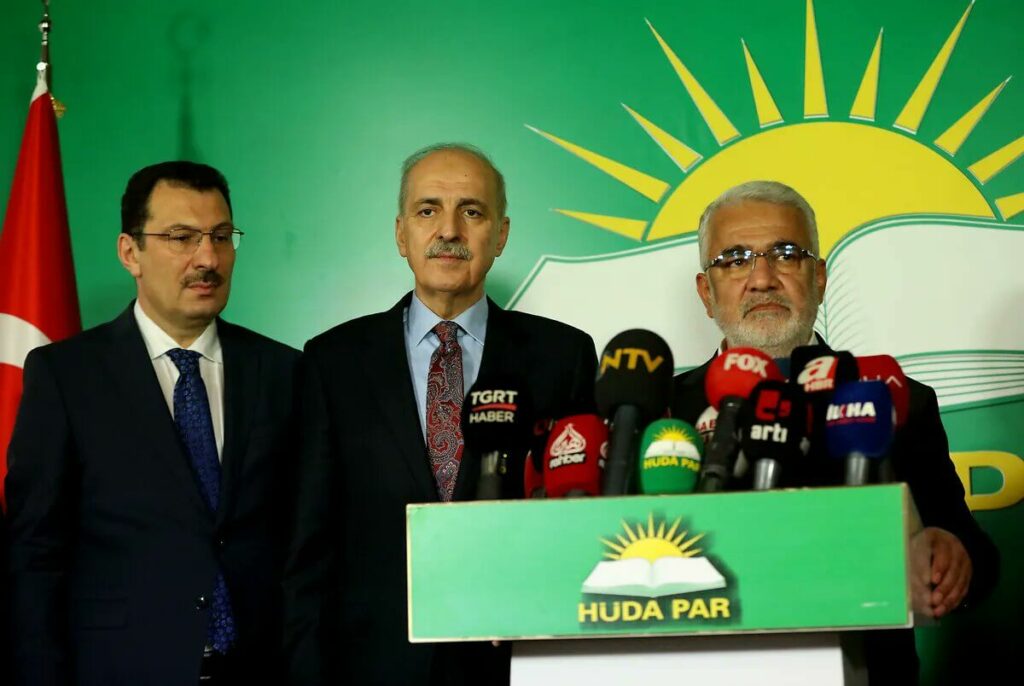The Justice and Development Party’s (AKP) alliance with the controversial Free Cause Party (HÜDA-PAR) and the latter’s resulting representation in the Turkish parliament have sparked widespread dissent and numerous protests throughout Turkey.
The roots of the outrage stem from HÜDA-PAR’s alleged ties to an extremist militant group called Hizbullah and its regressive stance on social issues — factors that many perceive to be at odds with democratic principles. The AKP’s alliance with HÜDA-PAR continues to dominate the public discourse as a runoff election approaches, stoking opposition and widespread discontent.
Turkey is poised to hold a runoff on May 28 following initial results from the May 14 presidential election that showed incumbent President Recep Tayyip Erdoğan failing to secure a victory against his secular rival, Republican People’s Party (CHP) leader Kılıçdaroğlu.
According to the official results, Erdoğan received 49.52 percent of the vote, while Kılıçdaroğlu, the candidate of the opposition bloc Nation Alliance, garnered 44.88 percent.
According to the yet unofficial results of the parliamentary elections, the Public Alliance, comprising Erdoğan’s ruling AKP, its far-right ally the Nationalist Movement Party (MHP), the Islamist New Welfare Party (YRP), and the nationalist Grand Unity Party (BBP), secured a parliamentary majority, amassing 321 of 600 seats in total.
HÜDA-PAR secured four seats in parliament in the elections, having been elected from AKP’s candidate lists.
The AKP’s choice to ally with HÜDA-PAR, in spite of the latter’s alleged connections to Hizbullah, has drawn harsh criticism from diverse segments of society. Hizbullah is an extremist militant group designated as a terrorist organization by Turkey. It has been accused of kidnappings, torture and targeted assassinations, predominantly aimed at individuals linked with Kurdish political movements. Notorious incidents such as the kidnapping and murder of Muslim feminist author Konca Kuris in 1999 and the assassination of Diyarbakır’s police chief Gaffar Okkan in 2001 have marred HÜDA-PAR’s past with violence since the party’s history is inextricably linked with Hizbullah.
Following the decision to end an armed insurgency in 2002, individuals with ties to Hizbullah founded an association known as Solidarity with the Oppressed (Mustazaflar ile Dayanışma Derneği or Mustazaf-Der) in 2003. The association then became known as the Movement of the Oppressed (Mustazaflar Hareketi). A large gathering was organized by Mustazaf-Der in Diyarbakır in April 2010 to commemorate the Islamic prophet Muhammad’s birthday (Mawlid), with crowd estimates ranging from 2 to 2.5 million attendees. Shortly after, however, a court in Diyarbakır ordered the closure of the association on the grounds of “conducting activities on behalf of the terrorist organization Hizbullah,” a decision upheld by the Supreme Court of Appeals in May 2012.
The Movement of the Oppressed subsequently declared its intention to form a political party in late 2012, intending to challenge the dominance of the left-wing, pro-Kurdish Peoples’ Democratic Party (HDP). The Free Cause Party (Hür Dava Partisi or HÜDA-PAR) was founded on Dec. 19, 2012. The party’s name is an allusion to the name Hizbullah, as the former means “Party of Allah” in Arabic, while the latter name’s abbreviation, HÜDA-PAR, connotes the same, as HÜDA means God/Allah in Kurdish. The party was founded on the principles of Kurdish nationalism and Sunni Islamism.
Since its inception in 2012, HÜDA-PAR has run in the parliamentary elections of June 2015 and 2018, abstaining from the November 2015 re-runs. In the 2018 presidential elections and again in 2023, the party supported Erdoğan. With its extreme viewpoints on social matters, the party has secured marginal electoral support, acquiring less than 1 percent of the vote in past elections.
For the 2023 Turkish parliamentary elections held on May 14, HÜDA-PAR entered the race as part of the AKP list vying for four seats. The AKP’s decision to ally with HÜDA-PAR angered many, who pointed to the party’s history with Hizbullah.
HÜDA-PAR can be described as an extreme Islamist party and the political wing of the Hizbullah. The party calls for constitutional recognition of the Kurds and Kurdish language, education in one’s mother tongue, the decentralization of state power and the strengthening of local administration. It also advocates for the lifting of restrictions on freedom of religion and worship, the criminalization of adultery and the recognition of religious marriages. Moreover, HÜDA-PAR calls for gender segregation in education and advocates increased gender segregation in public spaces with women incentivized for women-only jobs. The party opposes LGBT rights and routinely criticizes the HDP for its support of them.
In addition to these policies, Zekeriya Yapıcıoğlu, the leader of HÜDA-PAR, has sparked further controversy by refusing to label both Hizbullah and the Kurdistan Workers’ Party (PKK) as terrorist organizations. His comments regarding Hizbullah from last year have recently resurfaced on social media, intensifying the debate. Yapıcıoğlu responded to inquiries about Hizbullah’s status with a definitive “No,” clarifying, “You call them terrorist organizations; I call them PKK and Hizbullah.” This further underscores the tensions surrounding HÜDA-PAR’s political stance and its inclusion in the ruling coalition.
Public protests have surged across stadiums during football matches, turning these sporting events into platforms for expressing public dissatisfaction with and opposition to HÜDA-PAR. Chants such as “We don’t want Hizbullah in the parliament” reverberate among spectators, reflecting their anxiety over the party’s alleged affiliations and potential impact on Turkey’s political landscape.
Critics contend that the party’s repressive stance on women’s rights is incompatible with the tenets of a modern, inclusive society.
With the runoff election on the horizon, the alliance between the AKP and HÜDA-PAR has become a central issue in Turkey’s political arena. The historical ties of HÜDA-PAR with Hizbullah, its radical ideology and concerns surrounding women’s rights have incited opposition and wide-ranging dissatisfaction. The election results will not only dictate Turkey’s future path but will also provide insight into the level of acceptance of ideologies tied to HÜDA-PAR within Turkey’s democratic framework.

